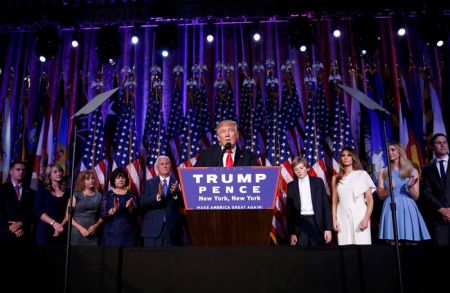Trump favored to win reelection as protests turn violent, top JP Morgan analyst says

Shifting public opinion on violent protests for racial justice coupled with the effects of "cancel culture" will likely lead to President Donald Trump’s reelection in November, according to a top analyst at JPMorgan Chase & Co.
In a note to clients Monday, Marko Kolanovic, global head of the macro quantitative and derivatives strategy team at J.P. Morgan, said while many investors are prepared for the possibility of a win for Democratic presidential nominee Joe Biden, the current momentum for victory is behind President Trump.
“We currently believe that momentum in favor of Trump will continue, while most investors are still positioned for a Biden win,” Kolanovic wrote. “The impact on sectors and factors (momentum vs value, cyclicals vs tech, ESG) could be dramatic and investment portfolios should adjust for a potential Trump reelection.”
Kolanovic’s note, which has been cited by a number of finance publications including the Heisenberg Report, pointed to research from Omar Wasow, a politics professor at Princeton, on how the nature of protests can sway elections.
In an interview with the New Yorker’s Isaac Chotiner in May, published just days after George Floyd died in the custody of Minneapolis police officers, Wasow explained how violent and nonviolent protests affect political outcomes differently.
“I would say that nonviolent protests can be very effective if they are able to get media attention, and that there is a very strong relationship between media coverage and public concern about whatever issues those protesters are raising,” Wasow said.
“But there is a conditional effect of violence, and what that means, in practice, is that groups that are the object of state violence are able to get particularly sympathetic press—and a large amount of media coverage. But that is a very hard strategy to maintain, and what we often see is that, when protesters engage in violence, often in a very understandable response to state repression, that tends to work against their cause and interests, and mobilizes or becomes fodder for the opposition to grow its coalition,” the professor added.
And using the civil rights movement as a case study, Wasow explained why nonviolent protests are so difficult to maintain.
He said “images of people observing their kinfolk being brutalized on television” helped to foment “a more militant wing” of the civil rights movement which endorsed violence in self-defense, scaring off moderate white supporters who might have initially been sympathetic to their cause.
“When we observed a wave of violent protests in the mid to late '60s, those white moderates who supported the Democratic Party after the passage of the Civil Rights Act of 1964 defected to the Republican Party in 1968. So when the state was employing violence and protesters were the targets of that violence, the strategy worked well, and when protesters engaged in violence—whether or not the state was—those voters moved to the law-and-order coalition,” Wasow said.
Applying that same principle to the 2020 elections, Kolanovic said he expects up to a 10-point shift from Biden to Trump as violent protests continue to be documented by journalists online.
“It is highly likely that social media distribution of videos of looting in Chicago, L.A. and NYC, arson in Minneapolis, Wisconsin, Portland, Seattle, etc. have led to a significant shift in election odds in favor of Republicans,” Kolanovic wrote.
“Furthermore, by doing statistical simulation of the 1968 election, the author [Wasow] concluded that 1968 demonstrations directly resulted in the election of a Republican president. The impact of protest violence on the 2020 elections may be even larger. The reason is the broad online availability of violent footage (everyone can record and share in real time), but also the ability to influence social media to amplify this message (e.g., similar to the social media spread of Wikileaks emails in 2016),” he added.
Kolanovic also pointed to the impact of cancel culture on voters’ honesty in polls giving a misleading picture of the true support for the president.
A recent survey by CloudResearch showed that approximately 10% of Trump supporters indicated they were unlikely to be honest in phone polls, while only 5% of Biden supporters said the same.
"We find that this 'cancel culture' effect could artificially skew polls in favor of Biden by 5-6%," the JP Morgan analyst wrote.
Other factors Kolanovic sees as likely to influence the outcome of the election are developments in the coronavirus pandemic, which could improve in the next two months, and the outcome of the presidential debates.





















